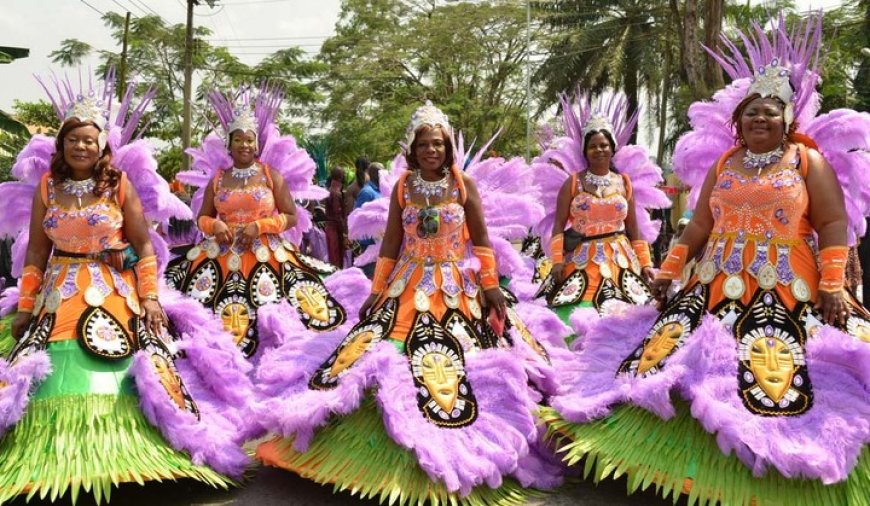Perspectives on Origin of Carnival

Arnold B. Udoka
The exact origin of carnival in the world is at best, speculative. There are, of course, diverse claims to its origin, albeit, without any proofs to substantiate. However, history is replete with various and numerous rituals, festivals and carnivals which express man’s relationship with his society and nature irrespective of race, religion and region. Such histories have excavated ancient myths and legends – like the orphic Dionysus - to inform us of the existence of events of carnivalesque nature when “...a large statue of Dionysus was carried from the temple to the theatre of Dionysus at the foot of the Acropolis. This procession was of much importance to the Athenians and Greeks and large numbers of the people attended the parade. The parade itself was a spectacle, and intended as a re- enactment of Dionysus’ journey to Athens” (www.brighthubeducation).
In contemporary times, the nomenclatures of ritual, festival and carnival have generated confusion among scholars especially in societies where there are thin lines between the sacred and the profane; where art is life and life is art, as opposed to societies where there are clear distinctions between the sacred and profane. The Western world represents the later.nUsing drama as an indicator, Horn posits that, “...contemporary discussion of the nature and origin of drama and the other performing arts in Africa has been characterized by the unnecessary imprecision of nomenclature, an unfortunate tendency to identify any performance, regardless of formal or functional qualities as drama. This curious refusal to acknowledge generic distinctions bears scant benefit. There is little point in calling a leopard an animal when we can call it a leopard” (181).
Even without the confusion generated by Western nomenclatures and classifications, it is still difficult to pinpoint when carnival started in Africa due largely to the absence of written records, mired and arrested civilizations which have been the lot of this continent. The absence of preserved history of carnival in Africa does not, however, negate the presence of carnival in the human society or wherever in the world either as an organic, home-grown and welcomed development or through rebellion.
Fundamentally, carnival is one of man’s survival strategies to express his soul’s cry for freedom, joy, companionship and symbiosis with nature. It underlines the ubiquity of man’s need to live in harmony with a relentlessly harsh environment – a life of perpetual adaptations and adjustments dictated by both nature and the action or inaction of man – by analytically and critically applying his intellect, and creatively so, to evolve a model that best suits and guarantees his/her survival.
In the context of the Carnival Calabar and Festival - a most tangible tourism product in the Cross River state calendar- the carnival has been re-birthed as a rallying point which impacts on diverse things among which are merry-making, diplomacy at both domestic and international levels and most importantly, the commodification of the performative arts. The indigenous performing art forms which are in superabundance in the State along with the avalanche of social choreographies in the Nigerian cultural space and around the world have conjoined into a potpourri of sorts and confer significance to this yearly meet. The spine of this awesome event is the yearly declaration of themes to guide the bands in the offerings to the public. The themes have been diverse and topical and thus responsive to socio-political trends and steep in interrogating issues of urgent social concerns and significance through the use the art forms.
From inception the thematic thrusts of the Carnival Calabar have become the signposts of how ignored and dying art forms can be revived, brought to relevance and put to good use for the benefit of the people. One cannot easily forget that full blown colonialism left the Nigerian space only a few decades ago.
During and after colonialism, there were generally held notions or norms that the African is incapable of creating and sustaining anything from civilization to technology and everything else in-between. In fact, the demonstrable monumental and generous example is the inability of any African country or black nation on planet earth to host the All Black and African Festival of Arts and Culture (FESTAC’77) on the scale of the Nigerian edition. With the Carnival Calabar and Festival running successfully for the past fifteen Christmases, such myths have exploded.
However, there is something positive about the Carnival Calabar. There is a silent consensus among the policy makers, band leaders, artists, the public, Cross Riverians and tourists alike, to keep this awesome experience forever because of the refreshingly new and topical themes that cause the public to reflect and also desire to experience the visual and aural interpretations year in and year out.
Therefore, Carnival Calabar is an emergent new art form in a postcolonial, post-independence cosmopolitan setting in a third world country. Its challenges of survival are enormous and there is the perennial problem in the area of funding such a grand event. It is obvious that the originators of the Carnival Calabar thought through and set the project on a feasible trajectory whereby the works of arts - performative, literary and plastic - do not serve purposes akin to Epicureanism, but necessarily to, apart from image-making, alter in a positive sense, the economic equation in both Cross River State in particular and Nigeria in general by the increase in tourists receipts.
Udoka, Ph.D, Hsonta, Fgond, Fta, Maitc, is a lecturer in the Department of Media and Theatre Arts, University of Calabar
Excerpts from the book, Carnival Calabar: A Chronicle of Themes – 25 Years and Counting













































